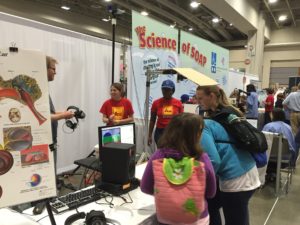As an institution of higher education in the 21st century, American University (AU) is committed to effectively engaging all students, especially the increasing number of students who come to college through non-traditional pathways.
The new transdisciplinary Initiative for STEM Education, Ethics, and Equity will prepare diverse student populations for transferable 21st century academic and non-academic jobs in science and technology, as well as related fields in communications and policy.
Through hands-on and mentored learning relationships, based on equitable and ethical principles that engage all students, AU will distinctly leverage new curricula that link STEM education with community-based learning, citizen science and civic engagement. We will prepare students to not only address global societal needs using science and technology, but to also weigh the larger equity and ethical issues they will confront as informed and engaged citizens. What we propose will be student centered and leverage best practices in the field of counseling and college advising and mentorship.
Mission/Vision:
The initiatives mission is to prepare diverse student populations for transferable academic and non-academic 21st century jobs in science and technology. Its vision is to emerge as a clearinghouse for STEM education, faculty and student development and scholarship, and to graduate a scientifically literate citizenry that makes informed, ethical decisions relevant to scientific inquiry and civic participation.
Goals:
The Center will develop a future workforce in academia, business, sector, entrepreneurship, science policy and science communication. Our short- and long-term goals include:
- To identify methods to address the persistence of educational inequities for middle- and high-school level students, into postsecondary levels;
- To pilot interventions that advances core competencies in student education and training, including interpersonal/intrapersonal skills, ethical decision-making, critical thinking and application of knowledge.
- To help policy makers, funders and education leaders in both school and out-of-school settings make informed decisions about how to best leverage the educational and learning resources.